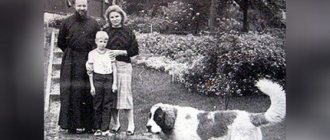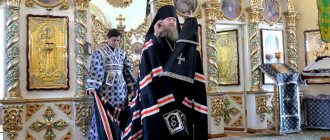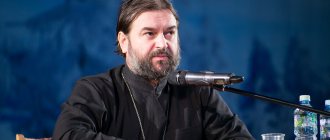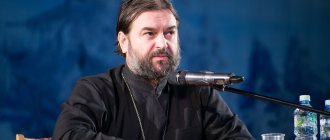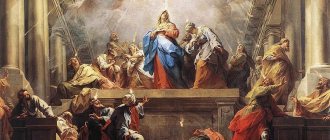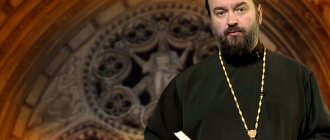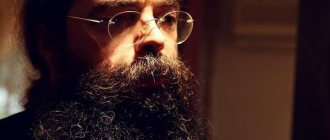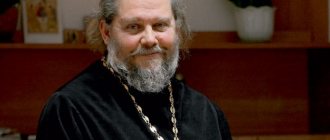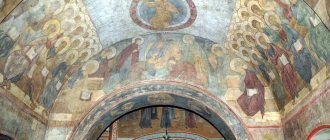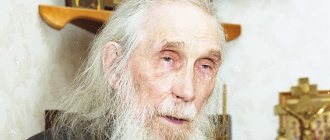Father Andrei Mazur is one of the most modest and respected clergy of the Russian Orthodox Church. He served her for an entire era, beginning his diaconal service from the time when the Russian Church was persecuted, and ending his earthly service in the era of its heyday. The voice and manner of service of Archdeacon Andrei Mazur gave the patriarchal services a special solemnity and attracted the attention of believers, motivating them to pray and helping them forget about their worldly problems. All his life he tried to honor the traditions of diaconal service with dignity. But, despite his high status, Father Andrei was a very simple and kind person.
Andrei Mazur was born in Poland, but later his native lands became part of the USSR
Andrei Lazarevich Mazur was born on December 8, 1926 in Novy Kokorevo. This village then belonged to the Polish Republic, and today it is part of Western Ukraine.
December 8, 1926
Andrey Mazur's birthday
He grew up surrounded by believers. Father was a church warden. But little Andrei didn’t really have time to communicate with his mother - she died when he was about 4 years old.
A church warden is a layman who is in charge of church affairs.
A year later the boy was already studying at a Polish school. He did not know the Russian language, but he studied Orthodoxy. In 1939 Western Ukraine became part of the USSR.
“My father had land, a farm, horses.
I was herding cows before I even went to school.
And he worked in the field, and mowed, and went for firewood.
I studied Polish at school, and now I remember it well.
Polish was taught as the main language, and Ukrainian as a foreign language.
I began to study Russian only at the seminary.”
Andrey Mazur
archdeacon
There were enough worries around the house: 8 hectares, where it was necessary to graze cattle, plow and mow.
Archdeacon Andrey Mazur at the service
In addition to study and work, young Andrei devoted time to church. I went to my father’s temple, where I sang in the choir.
The changes that Soviet power brought did not please Andrei Lazarevich:
“Before, all of us were believers; until 1939, I did not see a single non-believer.
Soviet power came and began: persecution, dispossession.
They deported me to Siberia - my mother’s relatives were deported for no reason: they declared with their fists for five hectares of land, a cow and a horse...
In general, they took everyone who was a little richer than the poor.
In general, we had neither beggars nor particularly rich, there were poor and average.”
Andrey Mazur
archdeacon
Archdeaconry
In 1990, Patriarch of Moscow and All Rus' Alexy Mazur was elevated to the rank of archdeacon. Until the death of the patriarch, Andrei served him until 2008. Their relationship was trusting. So Mazur recommended two of his classmates to the patriarch for important positions. In the future, these will be Metropolitan Vladimir of St. Petersburg of Ladoga and Metropolitan Filaret Denisenko.
This is interesting! Filaret Denisenko is a current schismatic and self-proclaimed Ukrainian Patriarch. Archdeacon Andrei Lazarevich was very worried about him and was upset because his friend had gone into schism.
Mature age
Under Patriarch Kirill, Mazur continued his service as archdeacon. Due to poor health, Andrei Lazarevich was soon unable to participate in divine services, although his beautiful voice is still remembered by many parishioners. Mazur previously had three children, but two died before their father. Patriarchal Archdeacon Andrei Mazur died on May 3, 2022.
Patriarch Kirill awarded Andrei Mazur the Order of Prince Vladimir, 1st degree
Andrei Lazarevich took part in the battles for Berlin, but was demobilized due to health reasons
In 1943, Andrei Lazarevich was drafted into the Red Army, but fortunately for him, the Soviet government was wary of the Poles.
“I had to fight very little.
For some reason, we “Westerners” were not allowed to go to the front,
kept in the Mari Republic - they believed
that we are unreliable, Banderaites, if anything,
Let's go over to the side of the enemy.
In the end they were already sent when there were battles for Berlin.
Andrey Mazur
archdeacon
The position that the future priest received was commander of a mortar squad. He was also the company singer.
Due to poor nutrition, Andrei Lazarevich ended up in the hospital. And it’s not surprising: after all, among the soldiers it was considered lucky to end up on a kitchen duty to bake potato peelings.
Sometimes there were lucky days - when food parcels arrived from home, but this did not always happen. Due to health problems, Andrei Mazur was demobilized.
In the army, Andrei Lazarevich mastered the Russian language. More precisely, I learned to speak it.
As for writing, he had no success in it, and he could hardly have found the time to study it seriously.
Teenage years and early life
The boy’s youth came during the Great Patriotic War. Times were difficult, persecution of the church continued. Despite this, Andrei Lazarevich was able to maintain his fortitude and strength of faith.
Military service
Mazur was drafted into the Red Army in 1943. The service took place in the reserve regiments, where the guy was the lead singer. Even then, his voice captivated people. In the winter of 1945, Andrei Lazarevich was sent to the front. As a mortar commander, he took part in the battles near Berlin. During the war years the boy received awards:
- Order of the Patriotic War, second degree;
- medal "For the capture of Berlin";
- medal "For victory over Germany in the Great Patriotic War of 1941-1945."
Admission to the Lavra
When Andrei was drafted into the army, he made a promise. If he returns from the front alive, he will devote his entire life to serving in the church. The promise was destined to be fulfilled.
Father Andrei at a service in the Epiphany Cathedral in Moscow
Immediately after finishing his military service, Andrei Lazarevich became a novice in that same Pochaev Lavra. There he sang in the choir for two years, and also ran a bakery and refectory.
Seminar years
In 1948, the future protodeacon entered the Moscow Theological Seminary, which was then located in the Novodevichy Convent and was considered an Institute of Theology. During his studies, Andrei also studied at the Moscow Conservatory.
When the young man was faced with a choice: a conservatory or a seminary, Andrei chose the second. Mazur studied at the seminary for only two years. A trip with a friend to Perm became fateful.
Despite persecution, Father Andrei served in many churches and sang in the choir
In 1950, Father Andrei became protodeacon of the Perm Cathedral - he served with the same Archbishop John who advised him to get married.
1957
this year Father Andrey moved to serve in Leningrad
In 1957 it was necessary to move to Leningrad. Only there it became clear how truly difficult it was for the priests:
“I saw real persecution. Metropolitans were allowed to serve only in St. Nicholas Cathedral; it was a cathedral.
If a metropolitan wanted to serve in another church, permission from the Commissioner for Religious Affairs was required.
We were also forbidden to serve in other churches.
On Epiphany, when people stood in line for holy water, we sometimes took the water outside to shorten the line, but if an authorized person came, we were forced to return to the temple.”
Andrey Mazur
archdeacon
Until 1968, Father Andrei served as protodeacon of the Trinity Cathedral of the Alexander Nevsky Lavra. Metropolitan Nikodim appointed him there. The protodeacon combined this activity with another - he was a regent in the everyday choir.
See also the article Why renovation movements arose in the church
You can listen to Andrei Mazur’s voice on the video service:
Then he was transferred to the Leningrad Cathedral, where Father Andrei participated in divine services and sang in the choir for twenty-two years.
Father Mazur served in the Cathedral of the Kazan Icon of the Mother of God (St. Petersburg) for 22 years
Voice of the Russian Church: In blessed memory of Archdeacon Andrei Mazur
On May 3, 2022, in the 92nd year of his earthly life, one of the most beloved clergymen of the Russian Church among the church people, the long-standing patriarchal archdeacon, Father Andrei Mazur, reposed in the Lord.
“When people die, they sing songs,” there is a bit of amazement in these words of the poet Velimir Khlebnikov. Why is the departure of our neighbors to another world among Orthodox people usually accompanied not by mournful crying, but by chants? And on Easter days - with bright and joyful chants? It is not difficult to answer this; it is much more difficult to accept a truly Christian attitude towards death - as a little Easter, and not a tragedy. Of course, this awareness will not save us from mournful sadness and tears (even Christ shed tears upon learning of the death of His friend Lazarus), but it can save us from the sin of despondency. After all, the most important thing for a Christian is the realization that in fact there is no death, and earthly dying is birth for Eternal life.
So, in one of his sermons in the difficult post-war year of 1946, the Russian Chrysostom of the 20th century, Metropolitan of Krutitsky and Kolomna Nikolai (Yarushevich) uttered very important words:
There is no death, but one must prepare for death all one’s life, because death is the door to eternity. What a great, incomparable happiness this is - our immortality! Saint Gregory the Theologian, discussing immortality in one of his sermons, says: “My spirit freezes when I imagine the endless future that lies before me.”
Metropolitan Nicholas met with eternity a long time ago. Today, the last people scorched by the Great War are leaving for another world. Among them is Archdeacon Andrei Mazur, who reposed in the Lord on May 3, on the same day as the ever-memorable Patriarch Pimen, with a difference of 28 years. It was after the death of His Holiness Bishop Pimen, in 1990, that Father Andrei became known to all church people - to everyone who attended the Patriarchal service at least once, who at least once saw its television broadcast. It was simply impossible not to remember this man: his unique bass, not so much loud as deep, stood out against any background. And that is why for decades the voice of Archdeacon Andrei was the real “voice of the Russian Church.” Not a preaching or public voice, Father Andrei was always very modest, shunning fame and glory, but that is why his sound was no less significant: it was the liturgical voice of our entire Church.
One of the last official photographs of Father Andrei Mazur (right). Photo: patriarchia.ru
Son of Pochaev Rus'
If you take a map and look at where Father Andrei was born, a person who knows little about church history, but is experienced in modern politics, will be surprised: “But this is Galicia! Westernmost Ukraine, a hotbed of independence and Russophobia!” Yes, but not so. Indeed, the future patriarchal archdeacon was born on the territory of the Ternopil region, which at that time was part of the “Second Polish-Lithuanian Commonwealth” - the Polish Republic during the reign of Jozef Pilsudski.
According to the memoirs of Father Andrei, at school he studied in Polish, and in those years in parish churches they were forced to serve in Ukrainian, however, even in those days, the Holy Dormition Pochaev Lavra, near which the future archdeacon spent his childhood and youth, remained a stronghold of Russian Orthodoxy in Western Russian lands. To the point that even now, in conditions of an extremely aggressive environment, they firmly remain faithful to canonical Orthodoxy, not only not thinking about anti-Moscow “autocephaly,” but being in the vanguard of defenders of the unity of the Russian Church.
Pochaev Lavra. 1930s. Photo: pravoslavie.ru
Probably, it was precisely this closeness to Saint Pochaev that instilled in young Andrei Lazarevich Mazur a strong desire to serve the Church of Christ. Therefore, after serving in the ranks of the Workers 'and Peasants' Red Army, short but heroic (the future archdeacon took Berlin), he decided to become a Lavra novice, worked in the bakery, prosphora and refectory, sang in the choir (it was here that his magnificent bass was fully revealed ). And if not for the decision to enter the Moscow Theological Seminary (at that time - the Theological Institute at the Novodevichy Monastery), he would have become a Pochaev monk. But the Lord determined otherwise. This is how Father Andrei himself recalled it half a century later:
It was 1948. I sang in the choir. I studied well. Two years later, my friend invited me to his place in Perm. At that time Archbishop John (Lavrenenko) was there. Once upon a time he was the abbot near the Pochaev Lavra, in Kremenets. We came to see him. Of course, before that there was a service, they gave me the Apostle to read. I see that Vladyka has a cheerful face, then at the reception he says: “Andrey, come to us as a protodeacon.” I say: “Vladyka, I’m not married yet, I need to study.” - "Nothing". They gave me money, I went to my place in Ukraine, got married, and a month later I arrived and on September 17, 1950, was ordained a deacon... And in 1957, Bishop Alexy (Konoplev), later Metropolitan of Tver, who was then appointed to St. Petersburg to restore the Trinity Cathedral in Alexander- Nevsky Lavra, invited me to go with him: “Father Andrei, go to St. Petersburg, there is no one to serve.” That’s how I ended up in St. Petersburg.”
Orthodox Leningrader
1957 The beginning of the Leningrad ministry of Father Andrei (pictured on the left). Photo: pravoslavie.ru
Many different people have preserved memories of Orthodox life in post-war Leningrad. It was here that such pillars of the Russian Church of that period as Metropolitans Grigory (Chukov) and Elevferiy (Vorontsov), students of pre-revolutionary theological schools, served; in 1961-1963, the Leningrad See was headed by the future Patriarch Pimen, and from 1963 - Metropolitan Nikodim (Rotov ), teacher and mentor of His Holiness Patriarch Kirill.
By the way, our today’s Primate grew spiritually in the very same years when Father Andrei Mazur first served as protodeacon and sacristan at the Alexander Nevsky Lavra. And then in the St. Nicholas Cathedral, where the metropolitan subdeacon at that time was already the young Volodya Gundyaev, soon tonsured by Bishop Nikodim as a monk with the name Kirill, and then ordained by him as hierodeacon and hieromonk. The times were difficult, Khrushchev’s “thaw” turned into a real wave of persecution. People were no longer shot for their faith, but the pressure was constant and very strong. And some broke down, like, for example, the former professor of the Leningrad Theological Academy, Archpriest Alexander Osipov, who not only renounced his rank, but also joined active atheistic, and in fact, anti-God propaganda.
Father Andrei, despite all the difficulties of that time, faithfully served the Church of Christ. And until his last days he spoke very warmly about how Metropolitan Nikodim, who passed away very young in 1978, was able under these conditions to overcome the pressure of the local commissioner for religious affairs and truly revive the church life of the Northern capital.
This is how Bishop Gennady (Gogolev) of Kaskelen, a native of Leningrad and a graduate of St. Petersburg theological schools, remembers those times, in an exclusive interview with Tsargrad he spoke about the last years of Father Andrei’s ministry in what was still Soviet Leningrad:
“In the 1980s, opera bass Boris Shtokolov thundered in Leningrad; many were delighted with, for example, his performance of the role of Boris Godunov at the Mariinsky Theater. And in those same years, in the cathedral, I heard Father Andrei Mazur for the first time and suddenly realized that his liturgical singing and exclamations were much easier than for the famous opera singer. And for me, as well as my peers who were churched in the early and mid-1980s, Father Andrei was akin to a celestial being, a man unusually gifted, first of all, musically and vocally. But when I met him in person, I was struck by his amazing modesty.
Protodeacon Andrei Mazur, the future Bishop Anthony (Zavgorodniy) and the future His Holiness Patriarch Kirill, 1975. Photo: pravoslavie.ru
We met under the following circumstances. When I was already finishing seminary, I had the opportunity to serve as subdeacon several times with Bishop Arseny of Ladoga, today’s Metropolitan of Istra, first vicar of His Holiness the Patriarch. And in those days, Protodeacon Andrei Mazur rode with us in a simple “RAFIK”, communicating with us without any superiority, in a friendly way. And the most wonderful memory is associated with our joint trip to Petrozavodsk in 1990, when the relics of St. Elisha of Sumy were transferred to the Church from the local museum. And Father Andrei and I were traveling in the same compartment. And we, young subdeacons, joked that if our loud protodeacon snores, he will wake up the whole carriage. And when we arrived in Petrozavodsk, we realized that Father Andrei had not slept all night so as not to cause inconvenience to those who were traveling with him.
As for his further service as archdeacon of His Holiness the Patriarch of Moscow and All Rus', we must remember that he replaced another outstanding archdeacon - Father Stefan Gavshev. It must be said that Father Stefan had his own style of archdeaconal service; some liked it, while others did not like it at all. And the services with Father Andrei Mazur became completely different than with Father Stefan, they became much more prayerful and calm. Without in any way pronouncing judgment on Father Stefan and his liturgical manner, the fact remains a fact. The memory of Father Andrei remains unusually bright. The kingdom of heaven to him!”
Humble Patriarch of the Archdeaconal Ministry
With the election of Metropolitan Alexy (Ridiger) of Leningrad and Novgorod as the First Hierarch of the Russian Church in 1990, Father Andrei Mazur, long-time protodeacon of the Leningrad Cathedral, found himself in Third Rome, becoming a patriarchal archdeacon. From that day on, his voice began to be constantly heard in the Patriarchal Cathedral of the Epiphany in Yelokhov, and then in the revived Cathedral of Christ the Savior.
Archdeacon Andrey Mazur. Photo: Alexey Larionov, Holy Trinity Sergius Lavra.
There was practically not a single Patriarchal service (and His Holiness Patriarch Alexy II was famous for his special love for divine services, performing them much more often than the vast majority of other shepherds and archpastors), during which the majestic bass of Archdeacon Andrei could not be heard. It was at this time that Father Andrei had a student - a young graduate of the Historical and Archival Institute of the Russian State Humanitarian University, Alexander Ageikin. A man who served as protodeacon of the Cathedral of Christ the Savior for more than ten years, and today is the rector of the Elokhov Cathedral, of which Father Andrei remained a full-time cleric until his last days. Archpriest Alexander Ageikin also shared with Tsargrad his warm memories of the newly deceased Father Archdeacon:
“For me, Father Andrei is a real spiritual father, the man who gave birth to me to serve the Church. From the very first days of serving as a deacon, since 1996, I have always been close to Father Andrei. And as he himself said after my appointment as rector of the Yelokhovsky Cathedral: “I never thought that you would become my rector,” sincerely rejoicing at this, since he treated me like a son.
Archdeacon Andrey Mazur. Photo: patriachia.ru
An amazingly sensitive person, very subtle, very humble. Such people are rare. And when last night we received the news about the death of Father Andrei, it was joyful and sorrowful, both because Easter days are now continuing, and, of course, I remembered the very communication with Father Andrei, who had been very worried lately that he could no longer perform divine services. I immediately got the impression that a holy man had died, because in his devotion, in his fidelity and deep faith, he was a real Abraham, the Patriarch of the diaconal ministry. And this loyalty to the Church can be imputed to him as righteousness.
With all his soul he was an inextricable part of the Church; there was nothing of his own in him. And this is an amazing gift from a man who, through the deepest humility, perceived his ministry, which was the embodiment of his dream to serve as a deacon. While still in Pochaev, he prayed and asked God to become a deacon. Once Father Andrei said that he dreamed of his priestly ordination, and he woke up in tears.
He was a real deacon in all his ministry and in his entire life, because he did not see anything else for himself. And to us, young deacons, who just as sincerely wanted to serve, he gave all of himself without reserve. At the same time, he was so humble, simple and accessible, no one ever heard a single rude word from him, and I am sure that no one can remember anything negative about him.”
December 2016. One of the last services of Father Andrei. Photo: patriarchia.ru
Of course, this is only a small fraction of what can be said about Father Andrei, whose body will very soon find eternal peace within the walls of the Alexander Nevsky Lavra, so beloved by him. His soul, as they say in funeral prayers, will dwell in good things, and his memory will endure forever. In the blessed dormition, grant eternal peace, O Lord, to Your departed servant, the newly departed Archdeacon Andrei, and create for him eternal memory!
Christ is Risen!
Alexy II elevated Father Andrei to the rank of archdeacon, and he gratefully continued his ministry
In 1990, Patriarch Alexy 2 appointed Andrei archdeacon. Since then, he served with him and accompanied him on various trips.
“I have more than 80 trips abroad. I’ve been to America, Italy, Japan, and many other countries.”
Andrey Mazur
archdeacon
After the death of Alexy II, Andrei became an assistant to Patriarch Kirill. However, he could no longer serve the Church at full strength. Leg disease prevented me from going to church.
However, this was not required of the archdeacon. He was given a free work schedule so that he could continue to carry out his mission.
Looking back on the years he had lived, Archdeacon Andrei talked about happiness and called himself a happy man:
“Happiness in my life is serving God. To stand at the Throne for 68 years with many bishops and patriarchs.
For me, happiness is communion with God. And, of course, family.
Not everything was good and smooth in life. My two sons died.
One had a malignant tumor; the other was very upset while standing over his brother’s grave, and did not live long after his death - he died suddenly.
The rest is fine.
And although I am not serving now, there is still no reason to complain.
I don’t serve with the patriarch because my legs hurt a lot.
My son-in-law, a priest, built the temple.
I go there for every service. For my 88 years old, it’s a blessing to still go to church myself.”
Andrey Mazur
archdeacon
Mature age
The Patriarchal Archdeacon continued his service under Patriarch Kirill. In the last years of his life, due to poor health, he rarely served at patriarchal services.
Church awards:
- Order of the Holy Equal-to-the-Apostles Grand Duke Vladimir, first degree;
- Order of St. Innocent, Metropolitan of Moscow and Kolomna, first degree;
- Order of the Holy Blessed Grand Duke Demetrius Donskoy, second degree;
- Order of the Holy Equal-to-the-Apostles Grand Duke Vladimir, third degree;
- Order of the Holy Venerable Seraphim of Sarov, third degree.
The Archdeacon, serving with His Holiness Patriarchs Alexy and Kirill, traveled all over the world, remaining in the memory of thousands of Orthodox Christians with his magnificent voice and his spiritual warmth and kindness. His life was not easy, two of his three children (two boys and a girl) died, but at the same time he managed to fully preserve these rare human qualities these days.
Patriarchal Archdeacon Andrei Mazur died on May 3, 2018.
